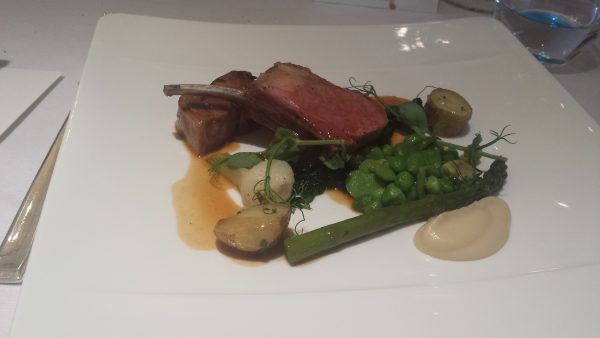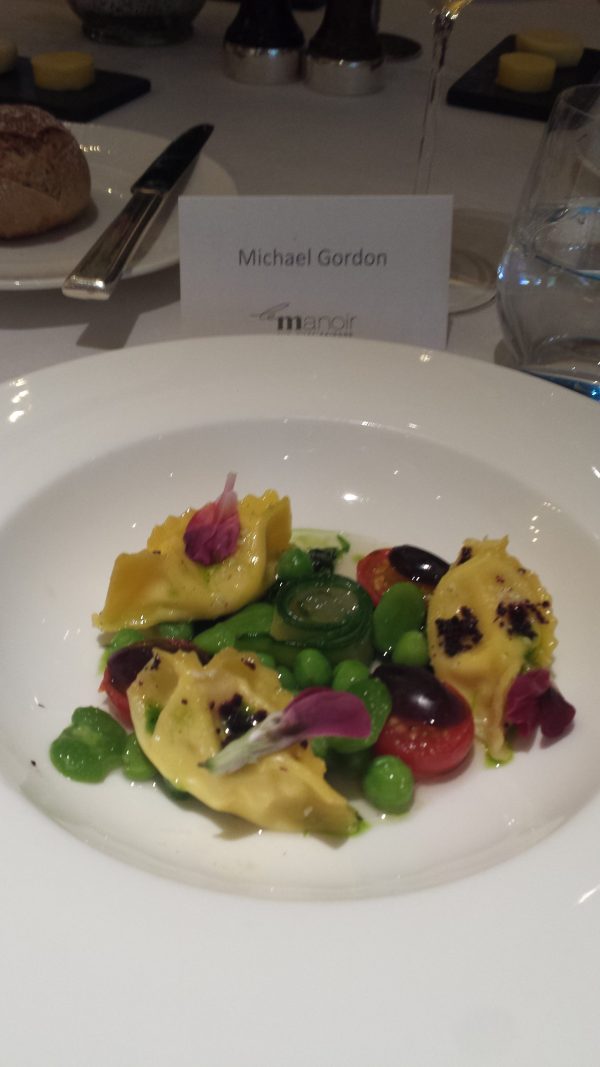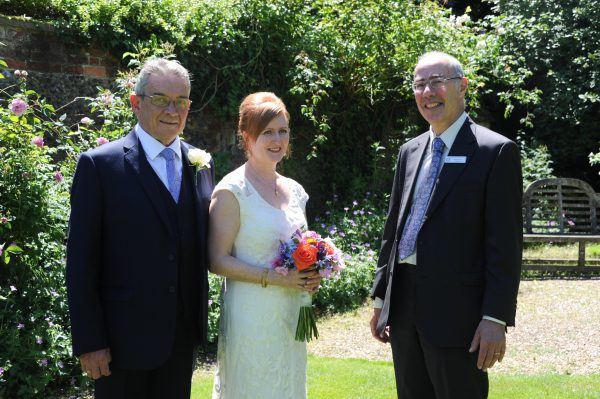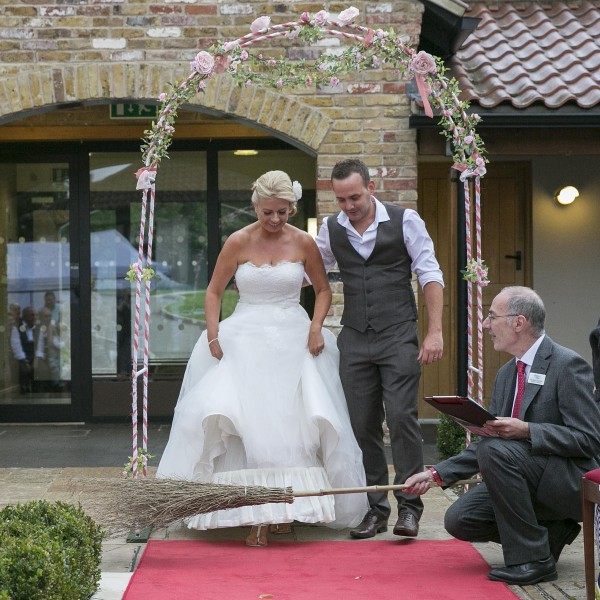
by Michael | Jun 11, 2019 | Blog
It sounds like I’m boasting, but I’m not! Honest!
Living it up
I recently spent three nights on Guernsey followed by lunch at Le Manoir aux quat’ Saisons in Oxfordshire.

Guernsey was lovely – I conducted a fabulous wedding there, but that’s not actually what I want to talk about.
It’s eating out.
My experience of the local cuisine (and, apart from breakfast, I was never eating in the same place twice) was most positive. Ingredients were fresh and well-cooked, portions were hearty and prices were reasonable. Service was good. A 2-course meal typically cost £20-30 a head, including a drink.
I really enjoyed every meal and felt very satisfied.
Another World

At Raymond Blanc’s Manoir, my family started off at the wrong building. We were corrected with a smile and not just told where to go, but were conducted there. This was typical of the service. It was friendly, not condescending, prompt and designed to ensure you felt properly looked after.
We loved our 4-course meal with wines. The presentation alone was another world, and the delicate tastes were not to be forgotten.

Fortunately, our friends were treating us, so I don’t know how many hundreds of pounds per head they paid!
I can only say that the whole experience was worth every penny that I imagine was spent.
So, if I’m not boasting, what’s the point of recounting all this?!
Well, it’s that you do pay for quality. I really enjoyed the Guernsey cuisine, but the Manoir experience was something else again. It was totally memorable (although relatively ephemeral). In fact, we set ourselves a goal to be able to afford to finance another meal there in ten years’ time!
What can we learn from this?
The Lesson
If you’re looking to create a ceremony, you will probably need to hire suppliers. How do you select between them?
You may have first-hand testimonials. You may like someone’s website. You will have a budget that you do not want to exceed.
So how to choose?
One of the pieces of ‘homework’ you should always do is to speak to the potential supplier. Ask the questions you need and get a feel for them. Compare (like-for-like, if possible) with a similar supplier.
As a celebrant, I know I am not the most expensive out there, but I am dearer than a number of my competitors. I believe I offer an absolutely above-average service, so I justify this easily enough.
I suspect that some celebrants price themselves at the lower end of the spectrum, and may offer commensurate service – and this may not be what the client is really after.
I know that paying ‘loadsa money’ does not guarantee quality, but there is a fair chance that someone at the higher end of the scale will supply wonderful service. Testimonials may well be a useful guide here when you are deciding.
At the end of the day, you have to settle on what price you are willing to pay, but don’t just jump for the cheapest! Find out how the supplier works and what they offer before deciding.

by Michael | May 7, 2019 | Blog
What makes a good Ceremony? You might not expect my answer to include the word “exam”, but it does!
Universities are doing it already. Schools are gearing up for it. I’m not referring to a ceremony. So, what is it?
The answer (as the title may suggest!) is: examinations!
You may well
ask: what have examinations in common with ceremonies?
Components
If you hark back to those halcyon days of your youth, you’ll surely recall exams.
There would be all the hard work (usually!) in the build-up, nerves during the run-in, writer’s block at some point of one exam (at least) and loads of writing. The writing might be sourced from your imagination; it might come from other people’s work (I mean quotes, rather than plagiarism!); it might be plans, sums or sketches. And a lot of concentration would need to be applied over time.
There might
be discomfort (uncomfortable chair, aching hand, exhaustion, pressure hot, stuffy room etc.) before
the inevitable debrief at the end.
Oh, yes! Does that bring back (happy!) memories?!
Comparison
So what does that have in common with putting a life-cycle ceremony together?
A ceremony normally requires a good script.
The celebrant must be guided by the information he/she has elicited from the client.
Now, many celebrants write (ie compose) their own readings or poems; some will write some of their own, but compile other pieces. I openly confess that I rarely write my own. I either adapt or use readings from other people who are probably hugely better writers than I dare claim to be.
So I speak for myself now, although I honestly don’t know who needs to do more work – the celebrant who follows their muse or myself having to trawl through material to find the appropriate text.
Like an examinee, I sometimes encounter writer’s block (when I simply can’t find the perfect piece). Like a student, I’ll leave it and return to it (hopefully, refreshed), and try again.
There’ll be a lot of research, and writing (or typing) for the student and for me. Concentration – it goes without saying – is vital I prefer the silence of the exam room. The student answer paper will go off for the examiner to mark; my draft goes off to the client for them to comment on and amend, if necessary.
The student will have a distinct time limit for their exam. That is pressure! In my case, I will have a deadline too, although it is rarely measured in hours. I think my record was to put together a ring-blessing in less than five hours, with the only guideline being that it should be non-religious!
Whatever the commonalities of student and celebrant, I wish all students all the best as they go through a trying time. (Maybe they’ll be looking for a ceremony later to celebrate their success!
For myself, I’m looking for more passes – preferably, with distinction!
For some ideas, please have a look at my YouTube channel (and subscribe!): https://www.youtube.com/channel/UC1wWfxIZw0VpZLbHrJAbV6A?view_as=subscriber

by Michael | Apr 8, 2019 | Blog
A lot of people are choosing to marry later than what was once the norm. The young at heart are stepping into younger people’s shoes!
Reasons for Marrying later
Quite often, the more mature are marrying later for financial or career reasons. Or the couple may want to put off having a family.
Then there are the returnees. They’ve been married before, and, for various reasons, are starting again.
One or both of them may be divorcees. Alternatively, they may have lost their first spouse.
Next, there are those who are afraid of taking such a big step. They don’t want to risk marrying until they are ‘sure’ that the relationship has a good chance of lasting.
Gay couples in a
civil partnership are increasingly looking to convert their legal status to
marriage, and many established pairs are therefore taking advantage.
Should the ceremony
be different?
A church wedding (if permitted) will be the same for an 18- or a 58-year-old. The same can be said for a register office ceremony. These are basically standard ceremonies.
If you’re looking for a tailor-made ceremony, then go for a civil ceremony.
Civil Ceremony
suggestions
By the nature of the
thing, no two civil ceremonies are likely to be the same, so it is impossible
to be prescriptive.
Nevertheless, when approached by couples who are young at heart, I still have the preliminary chat and establish what elements (if any) they have in mind. I make suggestions and then, over time, send over drafts for them to approve.
The areas I am likely
to cover include music, rituals and readings.
- Why shouldn’t older couples enjoy the same sort of music as youngsters (if that’s their choice)? They may choose the same rituals (a Unity Candle is always lovely – but maturer pairs may have families they want to involve, so this ritual can be expanded to include offspring etc.). Either age group may decide to include the offering of a gift, such as a red rose, to their parents during the marriage. A good celebrant will be able to supply suitable suggestions.
Of course, some
rituals (such as ‘jumping the broom’) may be less advisable for more mature
couples!
- There’s no reason why age should prevent couples from writing and/or reciting their vows or having the rings blessed.
- Readings can be whatever the couple want, and many are not age-specific in any way. However, some are suitable for more mature couples. I like this anonymous passage (for couples who are very young at heart!), and I conclude with it:
“The question is
asked: ‘Is there anything more beautiful in life than a young couple clasping
hands and pure hearts in the path of marriage? Can there be anything more
beautiful than young love?’ And the answer is given: ‘Yes, there is a more
beautiful thing. It is the spectacle of an old man and an old woman finishing
their journey together on that path. Their hands are gnarled but still clasped;
their faces are seamed but still radiant; their hearts are physically bowed and
tired but still strong with love and devotion. Yes, there is a more beautiful
thing than young love. Old love.’
For some ideas, please have a look at my YouTube channel (and subscribe!): https://www.youtube.com/channel/UC1wWfxIZw0VpZLbHrJAbV6A?view_as=subscriber

by Michael | Jan 7, 2019 | Blog
On your wedding day, you can’t avoid being the centre of attention. That’s as it should be, of course, but if you’re shy and retiring, it can make life very difficult indeed.
An introvert prefers remaining in the background, doesn’t relish small talk and likes the quiet. None of these are staple constituents of the average wedding!
Of course, your celebrant will help you through it, but are there some strategies you can employ to reduce the stress?
Easing the Pressure
Let’s start at the planning stage.
You don’t have to have a huge, ostentatious affair. Why not arrange a sunset ceremony on a beach, or even a gathering in a back garden? A small occasion can often be thoroughly memorable and enjoyable, so don’t feel you can’t opt for a more modest event.
Try and keep fellow-planners to a minimum (well-meaning as others may be). Sure, you’ll need advice, but it’s your day. Too many voices will just cause you needless stress.
Rehearsing
If you’re going for a bigger bash, an idea is to go to the venue beforehand with your partner. Whether it’s a church or a hotel (say), just walk down the aisle together and get a feel for what it will be like. You’ll be surprised how helpful that can be.
A Prequel
Odd as it may seem, a lunch or dinner the day before with a number of family members and/or friends will help. They can chat with you, so it will mean less pressure on you on the big day, as you can give your attention to other people.
Attendants
With bridesmaids and a party come dresses, hairdressing, delegated jobs, etc. These can be stressful.
Why not reduce the number of these? That will mean less tension beforehand, and fewer attendants will allow you to enjoy more peace in your retreat just before the off.
Ensure that the attendants you choose will field requests, make introductions and organise people on the day (which might otherwise prove overwhelming for you). (Of course, a wedding planner/co-ordinator can do this job too.)
On the Day
If your partner is an extrovert, ask him/her to take the limelight, making small-talk and thanking everyone for coming.
Escape
Since you crave quiet, maybe you can schedule a few moments away from the maelstrom and take a little quiet time to recharge your batteries. That could be just a few minutes in the powder room, or perhaps you and your beloved have a room in the venue and you can ‘take five’ there.
If you allow yourself to recover, you will get through the day more easily.
The reception
A nice idea is for the newly-weds to be seated at a table with their attendants (and partners), rather than on a ‘top table’, where they are inevitably the centre of attention.
Rest
The day before the wedding, you should allow serious downtime for pampering, so that you are at your best for the day. Also consider deferring the honeymoon a while. Ideally, go a couple of days after your wedding, as you’ll want to recover, so you can get the most out of your trip. You’ll be surprised how much the nervous energy etc. will drain you.
Conclusion
Remember that your wedding will (one hopes!) be a one-off occasion – perhaps the only time you’ll have so many family and friends from both sides together. People will be on your side, surrounding you with love and goodwill. Don’t fight it, but allow yourself to absorb the atmosphere and revel in it.
Even if you’re shy and retiring, the event should turn out to be a lot easier and more wonderful than you ever expected.
For more advice, speak to Michael.

by Michael | Dec 4, 2018 | Blog
Celebrating a big event? Something special? Would you consider a quirky ceremony?
Surely a wedding or something needs to be religious? Or conventional, at least?
Of course, it can be. But that’s not to say that it can’t be a quirky ceremony. (Or partly quirky!)
After all, it’s your day, so you don’t have to be beholden to what other people think or expect.
I’m not suggesting that you should be tasteless or offensive – but you can be different. There is huge scope for creativity. It doesn’t take so much effort to come up with a memorable, meaningful and beautiful ceremony. And for all the help you will need, a civil celebrant can be there, with ideas and guidance. They are professionals and can really point you in the right direction.
So what do we mean by “quirky”?
The venue can be anywhere (subject to permission and possible payment!). I’ve conducted ceremonies at Stonehenge, by a canal, at the Savoy, atop an Iron Age fort, in a back garden, in a field – and the list goes on! You are only limited by your imagination (and purse)!

Rituals
Part of the ceremony can be something a little offbeat. You’ve probably read about handfastings in my blogs (eg https://vowsthatwow.co.uk/handfasting-whats-that/). That might appeal.
A ritual that brings a smile to a wedding is “Jumping the Broom”. The couple together jump over a besom (accompanied by appropriate words) to symbolise sweeping in the new.
You may opt for a rose ceremony. Or there’s the Unity Sand option, which is lovely. Both partners simultaneously pour sand in the colour of their individual choice into one larger bottle, so that the colours merge, just as their lives will.
Readings & Music
The content of the ceremony is ‘up for grabs’ too. The tone is up to you. There is no compulsion to include heavy, serious readings, if you don’t want them. Why not have a humorous poem or text, or even several?
Choose who will read – or even sing – for you.
Similarly, while there’s absolutely nothing wrong with having a serious, classical piece played, your tastes may actually be rather different. So by all means let the music reflect these.
Your story, your vows
Personally, I welcome the opportunity to make ceremonies that I conduct as personal as possible. I believe the guests enjoy and appreciate this a lot too.
One feature I like to include, therefore, is what I call the couple’s “story”. In the case of a wedding, it might be how they met, adversity they had to overcome, and what attracted them to each other.
Another way they can personalise their ceremony is to write and declare their own vows. For a Vow Renewal, maybe the couple would rewrite their vows, or prepare something about key moments in their relationship.
Although I’m always there to guide and advise, I think it’s best if the couple actually write this part themselves, if possible.
So I hope you now see that there’s nothing wrong with individualising your ceremonies – indeed, this can often make all the difference to the proceedings.
Go quirky!









